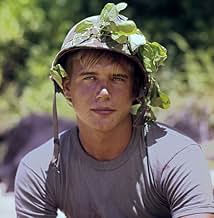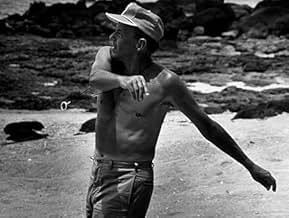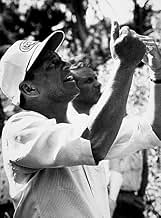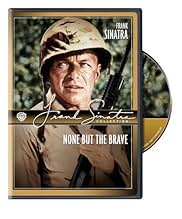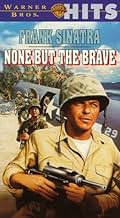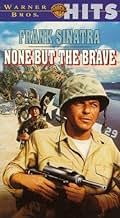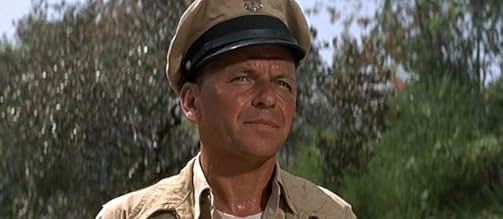NOTE IMDb
6,4/10
2,2 k
MA NOTE
Ajouter une intrigue dans votre langueDuring WW2, a platoon of Marines crash-lands on a tiny Pacific island occupied by a small Japanese unit.During WW2, a platoon of Marines crash-lands on a tiny Pacific island occupied by a small Japanese unit.During WW2, a platoon of Marines crash-lands on a tiny Pacific island occupied by a small Japanese unit.
- Réalisation
- Scénario
- Casting principal
Takeshi Katô
- Sgt. Tamura
- (as Takeshi Kato)
Tôru Ibuki
- Pvt. Arikawa
- (as Toru Ibuki)
Ryûchô Shumpûtei
- Pvt. Okuda
- (as Ryucho Shunputei)
Avis à la une
On a tiny forgotten island in the Pacific, there a tiny and forgotten Japanese outpost--with men who'd become stuck there with no great hope of rescue. Into this tiny place arrives a crashing airplane filled with US Marines. When they land, hostilities naturally break out between the groups. However, after a while they realize that killing each other will solve nothing and they have to work together to survive--forging an uneasy peace and friendship between enemy combatants.
NONE BUT THE BRAVE is a film that is a real product of the times. Had anyone wanted to make such a film in the 1940s, they might just have been strung up for the film's very unusual sensibilities. Unlike older war films, in this one the Japanese are humanized a great deal and it's obvious that the film was made during the anti-war 60s (though early in the anti-war years). In many ways, this is a good thing--showing that people on both sides could be decent. Though in some ways the whole thing seemed a bit hard to believe--after all, very, very few Japanese officers would have admitted to not having faith in the war--this was a very 1960s sentiment.
As for the acting, it was generally good. Clint Walker was clearly the star, though Frank Sinatra had a decent co-starring role in this film that he both produced and directed. The Japanese actors also were pretty good. The only weak point was the way Tommy Sands' character was written--he was like a one-dimensional caricature instead of a real soldier. No young lieutenant is THAT obnoxious and stupid!!
Overall, an entertaining film but one that strains credibility, as the concept behind the film just doesn't make much sense for the 1940s. Still, if you can stop those voices in your head from complaining about the plot, it's a good and very different movie.
NONE BUT THE BRAVE is a film that is a real product of the times. Had anyone wanted to make such a film in the 1940s, they might just have been strung up for the film's very unusual sensibilities. Unlike older war films, in this one the Japanese are humanized a great deal and it's obvious that the film was made during the anti-war 60s (though early in the anti-war years). In many ways, this is a good thing--showing that people on both sides could be decent. Though in some ways the whole thing seemed a bit hard to believe--after all, very, very few Japanese officers would have admitted to not having faith in the war--this was a very 1960s sentiment.
As for the acting, it was generally good. Clint Walker was clearly the star, though Frank Sinatra had a decent co-starring role in this film that he both produced and directed. The Japanese actors also were pretty good. The only weak point was the way Tommy Sands' character was written--he was like a one-dimensional caricature instead of a real soldier. No young lieutenant is THAT obnoxious and stupid!!
Overall, an entertaining film but one that strains credibility, as the concept behind the film just doesn't make much sense for the 1940s. Still, if you can stop those voices in your head from complaining about the plot, it's a good and very different movie.
Like its better known cousin HELL IN THE PACIFIC, NONE BUT THE BRAVE is a story about US and Japanese troops stranded on a desert island during WW2. It's a tense and highly watchable tale that makes Frank Sinatra's sole directorial credit, and he also co-stars in the movie as the medic of the group.
The tale is quite low key and more of a character piece than an action film. There are action scenes here, but they're few and far between and low budget. Nonetheless the film looks classy and expensive with fine cinematography that brings the lush locations to life. As an anti-war piece of filmmaking, it ploughs much the same furrow as HELL IN THE PACIFIC, exploring the way in which all soldiers are the same and the parallels between the two units despite their utmost grievances.
There are some exemplary performances amid the cast members. Clint Walker is exceptional as the nominal group leader and Tatsuya Mihashi his equal as his Japanese rival. Sinatra himself gives an understated performance but the set-piece involving the amputation is the tensest and best in the whole film, a minor acting masterclass from the star. Only Tommy Sands falls apart with a turn that could best be described as a caricature of a real person.
The tale is quite low key and more of a character piece than an action film. There are action scenes here, but they're few and far between and low budget. Nonetheless the film looks classy and expensive with fine cinematography that brings the lush locations to life. As an anti-war piece of filmmaking, it ploughs much the same furrow as HELL IN THE PACIFIC, exploring the way in which all soldiers are the same and the parallels between the two units despite their utmost grievances.
There are some exemplary performances amid the cast members. Clint Walker is exceptional as the nominal group leader and Tatsuya Mihashi his equal as his Japanese rival. Sinatra himself gives an understated performance but the set-piece involving the amputation is the tensest and best in the whole film, a minor acting masterclass from the star. Only Tommy Sands falls apart with a turn that could best be described as a caricature of a real person.
an old idea done better in many other movies, i.e opposing sides find themselves in the same boat and fight and wonder why; odd part if the several misplaced performances; start with sinatra doing the typical club singer vegas performance except in uniform in the south pacific; follow that with the most bizarre- tommy sands, then a teen idol singer (oh, and sinatra's son in law) who was a little person with a little voice somehow not realizing what a fool he was acting by pretending to be a big tough marine booming out orders; it's just laughable; anyway, the best version of this is lee marvin in hell in the pacific; still a war movie but thoughtful, interestingly shot
There's a clumsiness to 1965's "None But The Brave" that you really shouldn't let get in your way of the film. The clumsiness is due to Frank Sinatra's direction -- he was a far, far better actor than a director, and wisely chose never to direct another film -- and it exposes itself most prominently in the film's heavy-handed "flashback" sequences.
Having gotten that out of the way, let's consider the film itself. World War II, a small island in the Pacific: a group of marooned GIs find themselves sharing space with an equally marooned group of Japanese soldiers. Reluctantly, a truce evolves; each side has something the other needs. During that truce, enemies develop -- if not a true friendship -- at least an understanding, an empathy, and a respect for, each other. This truce, of course, cannot endure. The outside world -- and the war -- must impose itself, and each side reacts according to its own sense of honor and duty. Rightly so.
Some reviewers have chosen to label this an 'anti-war' film. Perhaps it is. Myself, I prefer to think of it, rather, as a 'pro-humanity' film, one which recognizes that man will pit himself against man time and time again, and for reasons that may or may not be the best, but that -- in the end -- we can, each of us, even in the midst of the most horrific conflict imaginable, step away, even if only for the briefest of moments (or truces), and deal with each other as human beings.
That's what happens in "None But The Brave."
And if the ending is less than satisfactory, maybe it serves to makes us each wish for a better one . . . and a better world!
Having gotten that out of the way, let's consider the film itself. World War II, a small island in the Pacific: a group of marooned GIs find themselves sharing space with an equally marooned group of Japanese soldiers. Reluctantly, a truce evolves; each side has something the other needs. During that truce, enemies develop -- if not a true friendship -- at least an understanding, an empathy, and a respect for, each other. This truce, of course, cannot endure. The outside world -- and the war -- must impose itself, and each side reacts according to its own sense of honor and duty. Rightly so.
Some reviewers have chosen to label this an 'anti-war' film. Perhaps it is. Myself, I prefer to think of it, rather, as a 'pro-humanity' film, one which recognizes that man will pit himself against man time and time again, and for reasons that may or may not be the best, but that -- in the end -- we can, each of us, even in the midst of the most horrific conflict imaginable, step away, even if only for the briefest of moments (or truces), and deal with each other as human beings.
That's what happens in "None But The Brave."
And if the ending is less than satisfactory, maybe it serves to makes us each wish for a better one . . . and a better world!
A plane load of US Marines crashlands on a Pacific Island held by Japanese soldiers during WW2. The Marines include a green lieutenant (Sands), a veteran sergeant (Dexter) and a medic (Sinatra). Clint Walker plays the pilot who is more than just a pilot.
The Japanese have been bypassed by their own and are seeking a way off the island. There are a few skirmishes with the Marines and then a "truce".
But how long will it hold for?
Good characters, story and actors make it worth watching.
The Japanese have been bypassed by their own and are seeking a way off the island. There are a few skirmishes with the Marines and then a "truce".
But how long will it hold for?
Good characters, story and actors make it worth watching.
Le saviez-vous
- AnecdotesDuring downtime whilst shooting the picture, Brad Dexter saved Frank Sinatra from drowning when he dived into the ocean and rescued the floundering singer.
- GaffesOne African American belongs to the USMC platoon. At this time, US military was not an integrated military and Blacks were segregated. This black Marine couldn't have been a member of this platoon. The USMC was integrated in World War II, as according to the Marine hierarchy, "There is only one color in the USMC, Marine Corps green."
- Citations
Lt. Kuroki: Our island is a little chunk of coral in the Sakhalin archipelago. It is nameless and the Great War beyond its horizons ignores us, for we are the expendables of an amphibious landing, left to God, a forgotten outpost of the Imperial Japanese Army.
- Crédits fousThe line NOBODY EVER WINS appears in place of "The End" just before the end credits start, which is appropriate given the film's anti-war message.
- Versions alternativesSome prints of the film do not include subtitles for any of the Japanese sequences.
- ConnexionsFeatured in Stars of the Silver Screen: Frank Sinatra (2011)
Meilleurs choix
Connectez-vous pour évaluer et suivre la liste de favoris afin de recevoir des recommandations personnalisées
- How long is None But the Brave?Alimenté par Alexa
Détails
- Date de sortie
- Pays d’origine
- Langues
- Aussi connu sous le nom de
- Los valientes mueren de pie
- Lieux de tournage
- Sociétés de production
- Voir plus de crédits d'entreprise sur IMDbPro
- Durée
- 1h 46min(106 min)
- Rapport de forme
- 2.35 : 1
Contribuer à cette page
Suggérer une modification ou ajouter du contenu manquant



